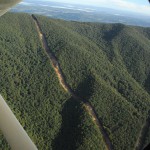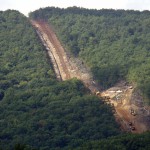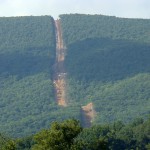- Peters Mountain -South side
- Peters Mountain – South side
- Peters Mountain – South side
- Peters Mountain – North side
This case study concerns a natural gas pipeline constructed in 2014 across the Jefferson National Forest (JNF) on Peters Mountain in Giles County, Virginia. The purpose of the pipeline construction project was to increase natural gas delivery to the Celanese Acetate LLC Plant on the New River near Narrows, Virginia. The construction company and pipeline owner is Columbia Gas of Virginia (CGV).
The project involved installation of a new 12-inch natural gas line parallel to an existing 6-inch natural gas line. The entire line in Virginia is about 3.5 miles, with about 0.8 miles in the JNF.
The pipeline project also extends about 13 miles across parts of Monroe and Summers Counties in West Virginia. The West Virginia segment of the pipeline upgrade is under the jurisdiction of the Federal Energy Regulatory Commission (FERC). The Virginia segment is not under FERC jurisdiction, and environmental permitting and oversight have been the responsibility of the Forest Service and the Virginia Department of Environmental Quality (VADEQ).
The segment of the CGV pipeline across the JNF was authorized by a Special Use Permit. Prior to issuing the permit the Forest Service prepared an Environmental Assessment (EA), as required by the National Environmental Policy Act. Multiple government agencies reviewed plans for the proposed project and provided comments for the EA. The Forest Service concluded the EA with a Finding of No Significant Impact and issued a Special Use Permit for the pipeline project on 02/10/14.
The Special Use Permit required compliance with all state and federal laws and regulations and with the directives of the Forest Land and Resource Management Plan. In particular, the Special Use Permit cited Forest Wide Standard, FW-1, which states that all activities that may affect soil and/or water quality are to follow the Virginia Erosion Control Handbook. Although the Special Use Permit required CGV to develop a site-specific erosion control plan, the Forest Service effectively depended on state regulations for protection of water resources.
Reliance on state regulations is a problem due to the relaxed approach to water resource permitting and enforcement for construction projects in Virginia —and it is a problem for pipeline construction projects in particular.
The VADEQ is responsible for ensuring compliance with state requirements for erosion and sediment control and storm water management. Pipeline construction companies, however, are allowed to (1) operate based on annual submission of general standards and specifications and (2) to maintain their own inspection programs. Coverage under the General Permit for Discharges of Stormwater from Construction Activities is similarly obtained by submission of registration statements in which pipeline and other construction companies agree to comply with General Permit requirements. In addition, the VADEQ routinely grants variances that enable pipeline construction companies to circumvent restrictions on the length of open trench allowable at any given time, even, as in this case, on very steep mountainsides.
As described in the following sections of this case study report, significant erosion and sedimentation problems at the CGV project on Peters Mountain can be linked to both waived regulatory requirements and a lack of regulatory agency oversight. The VADEQ exempted the company from the critical open-trench restriction and conducted no inspections during the active construction phase of the project. The Forest Service did not inspect the site until late in the construction process and after significant problems had developed.
ACCESS TO RELATED DOCUMENTS:
Land and Resource Management Plan for the JNF
National Forest Environmental Assessment for the CGV Pipeline Project
Erosion and Sediment Control Plan for the CGV Project
Forest Service Special Use Permit for the Project
Virginia Erosion and Sediment Control Handbook
Virginia Erosion and Sediment Control Regulations and Law
CGV Annual Standards and Specifications
Open-Trench Waiver Request and VADEQ Approval



